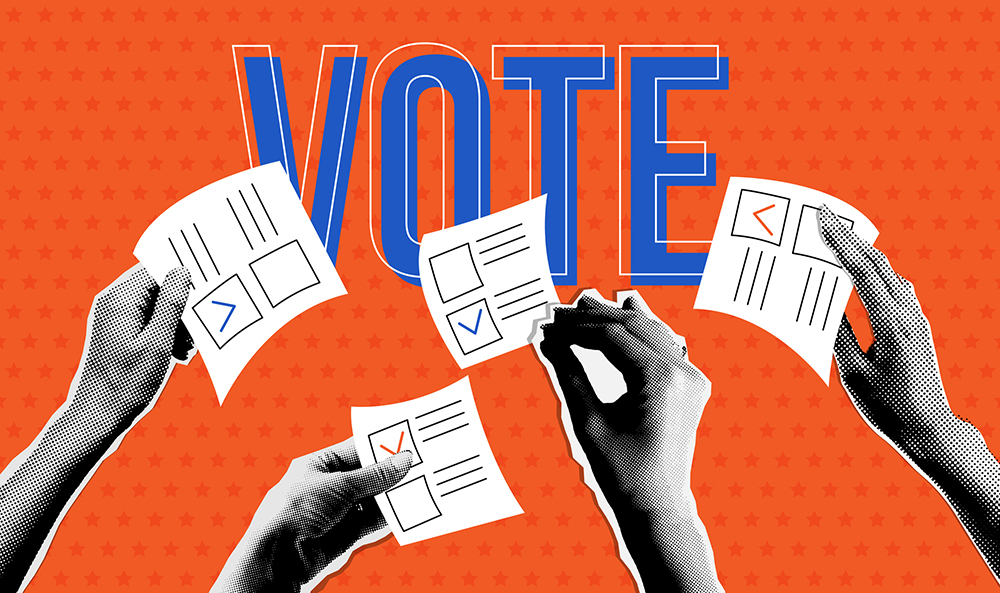How Do Voters Think About Electability?
Republicans and Democrats use different factors to decide which candidates have the best chance of winning general elections
Get all our news
Primary elections hold a lot of power over determining politics and who represents us in our elected offices.”
Laurel Harbridge-Yong
IPR political scientist

During the crowded 2020 Democratic presidential primary, many considered Joe Biden the most electable candidate given his moderate policy positions. Four years later, President Biden’s perceived lack of electability led him to end his 2024 re-election campaign, with Vice President Kamala Harris becoming the party’s nominee.
A candidate’s electability, or their chance of winning a general election, can impact primary results. However, few studies examine how voters understand electability.
New research by IPR political scientist Laurel Harbridge-Yong suggests that Republicans and Democrats think about electability differently during primary elections. She finds that Democrats believe moderate candidates have a better chance of winning in general elections, while Republican voters prioritize a candidate’s ability to fundraise.
“Primary elections are unique because people may be thinking about what's going to happen in the second stage of the election—the general—while they're making decisions in this [primary] stage,” Harbridge-Yong said. “That's where we thought that electability was a really valuable thing to look at because electability is something that may lead people to think strategically about politics.”
The researchers wanted to understand whether electability shapes how voters choose candidates. And they wanted to know what factors affect voters’ beliefs about which candidates are most likely to win an election.
Between May and August of 2022, the researchers conducted a survey experiment before primary races in four states. They focused on voters in Ohio, Pennsylvania, North Carolina, and Wisconsin, who would cast a ballot for a competitive primary race for senator, governor, or both.
Voters were presented with the candidates on the primary ballot and given either no information about them, or information about them in one of three categories: 1) which candidates were relatively more moderate, 2) which candidates raised more money, or 3) which candidates had prior experience in elected office. They were then asked how likely they thought the party would be to win in the general election if each candidate won the primary as well as how likely they would be to vote for each candidate.
While the researchers didn’t find a relationship between voters’ beliefs about which candidates had the best chance of winning and how they intended to vote, Harbridge-Yong says the timing of the study matters. They asked voters about competitive races a few weeks before primary elections, so some voters might have voted early. Others may have already decided on their preferred candidate.
“This was a bit of a hard test to see whether electability mattered,” she explained.
However, providing them with information about the candidates did shape perceptions of electability. But the perceptions differed by party. Democrats valued moderation, while Republications prioritized fundraising success when they were asked about electability.
Harbridge-Yong suggests that one reason Democrats may care more about moderation is because the party is made up of a diverse coalition. Republicans, on the other hand, often focus on ideological purity.
“It may be that the more moderate candidate is seen as more appealing to lots of different groups,” she said.
A consequence of voters’ different beliefs about electability could be that Republicans pick more extreme candidates than Democrats during the primary stage. By valuing fundraising, Republican voters may also favor wealthy candidates who can self-fund their campaigns or shift politics toward the interest of wealthy donors.
More research is needed to evaluate these potential implications and to understand why voters in the two major parties think differently about electability, including how factors like party strategy and media consumption play into voters’ beliefs.
Harbridge-Yong, who is continuing this line of research during the 2024 election cycle, says this study helps make sense of what information voters use to decide which candidates are most likely to win general elections.
“Primary voters themselves are very important because in U.S. politics, primary elections, in many cases, are the only election that matters,” she said. “Primary elections hold a lot of power over determining politics and who represents us in our elected offices.”
Laurel Harbridge-Yong is professor of political science and an IPR fellow.
Photo credit: iStock
Published: August 12, 2024.


